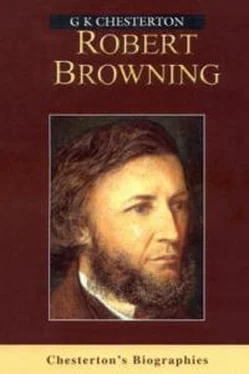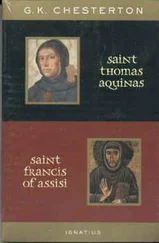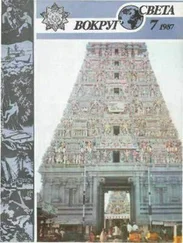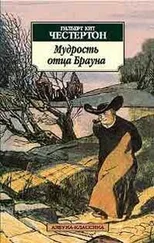Гилберт Честертон - Robert Browning
Здесь есть возможность читать онлайн «Гилберт Честертон - Robert Browning» весь текст электронной книги совершенно бесплатно (целиком полную версию без сокращений). В некоторых случаях можно слушать аудио, скачать через торрент в формате fb2 и присутствует краткое содержание. Год выпуска: 2014, Издательство: epubBooks Classics, Жанр: Биографии и Мемуары, на английском языке. Описание произведения, (предисловие) а так же отзывы посетителей доступны на портале библиотеки ЛибКат.
- Название:Robert Browning
- Автор:
- Издательство:epubBooks Classics
- Жанр:
- Год:2014
- ISBN:нет данных
- Рейтинг книги:5 / 5. Голосов: 1
-
Избранное:Добавить в избранное
- Отзывы:
-
Ваша оценка:
- 100
- 1
- 2
- 3
- 4
- 5
Robert Browning: краткое содержание, описание и аннотация
Предлагаем к чтению аннотацию, описание, краткое содержание или предисловие (зависит от того, что написал сам автор книги «Robert Browning»). Если вы не нашли необходимую информацию о книге — напишите в комментариях, мы постараемся отыскать её.
Robert Browning — читать онлайн бесплатно полную книгу (весь текст) целиком
Ниже представлен текст книги, разбитый по страницам. Система сохранения места последней прочитанной страницы, позволяет с удобством читать онлайн бесплатно книгу «Robert Browning», без необходимости каждый раз заново искать на чём Вы остановились. Поставьте закладку, и сможете в любой момент перейти на страницу, на которой закончили чтение.
Интервал:
Закладка:
Robert Browning
G. K. Chesterton
Chapter I
Browning in Early Life
On the subject of Browning's work innumerable things have been said and remain to be said; of his life, considered as a narrative of facts, there is little or nothing to say. It was a lucid and public and yet quiet life, which culminated in one great dramatic test of character, and then fell back again into this union of quietude and publicity. And yet, in spite of this, it is a great deal more difficult to speak finally about his life than about his work. His work has the mystery which belongs to the complex; his life the much greater mystery which belongs to the simple. He was clever enough to understand his own poetry; and if he understood it, we can understand it. But he was also entirely unconscious and impulsive, and he was never clever enough to understand his own character; consequently we may be excused if that part of him which was hidden from him is partly hidden from us. The subtle man is always immeasurably easier to understand than the natural man; for the subtle man keeps a diary of his moods, he practises the art of self–analysis and self–revelation, and can tell us how he came to feel this or to say that. But a man like Browning knows no more about the state of his emotions than about the state of his pulse; they are things greater than he, things growing at will, like forces of Nature. There is an old anecdote, probably apocryphal, which describes how a feminine admirer wrote to Browning asking him for the meaning of one of his darker poems, and received the following reply: "When that poem was written, two people knew what it meant—God and Robert Browning. And now God only knows what it means." This story gives, in all probability, an entirely false impression of Browning's attitude towards his work. He was a keen artist, a keen scholar, he could put his finger on anything, and he had a memory like the British Museum Library. But the story does, in all probability, give a tolerably accurate picture of Browning's attitude towards his own emotions and his psychological type. If a man had asked him what some particular allusion to a Persian hero meant he could in all probability have quoted half the epic; if a man had asked him which third cousin of Charlemagne was alluded to in Sordello , he could have given an account of the man and an account of his father and his grandfather. But if a man had asked him what he thought of himself, or what were his emotions an hour before his wedding, he would have replied with perfect sincerity that God alone knew.
This mystery of the unconscious man, far deeper than any mystery of the conscious one, existing as it does in all men, existed peculiarly in Browning, because he was a very ordinary and spontaneous man. The same thing exists to some extent in all history and all affairs. Anything that is deliberate, twisted, created as a trap and a mystery, must be discovered at last; everything that is done naturally remains mysterious. It may be difficult to discover the principles of the Rosicrucians, but it is much easier to discover the principles of the Rosicrucians than the principles of the United States: nor has any secret society kept its aims so quiet as humanity. The way to be inexplicable is to be chaotic, and on the surface this was the quality of Browning's life; there is the same difference between judging of his poetry and judging of his life, that there is between making a map of a labyrinth and making a map of a mist. The discussion of what some particular allusion in Sordello means has gone on so far, and may go on still, but it has it in its nature to end. The life of Robert Browning, who combines the greatest brain with the most simple temperament known in our annals, would go on for ever if we did not decide to summarise it in a very brief and simple narrative.
Robert Browning was born in Camberwell on May 7th 1812. His father and grandfather had been clerks in the Bank of England, and his whole family would appear to have belonged to the solid and educated middle class—the class which is interested in letters, but not ambitious in them, the class to which poetry is a luxury, but not a necessity.
This actual quality and character of the Browning family shows some tendency to be obscured by matters more remote. It is the custom of all biographers to seek for the earliest traces of a family in distant ages and even in distant lands; and Browning, as it happens, has given them opportunities which tend to lead away the mind from the main matter in hand. There is a tradition, for example, that men of his name were prominent in the feudal ages; it is based upon little beyond a coincidence of surnames and the fact that Browning used a seal with a coat–of–arms. Thousands of middle–class men use such a seal, merely because it is a curiosity or a legacy, without knowing or caring anything about the condition of their ancestors in the Middle Ages. Then, again, there is a theory that he was of Jewish blood; a view which is perfectly conceivable, and which Browning would have been the last to have thought derogatory, but for which, as a matter of fact, there is exceedingly little evidence. The chief reason assigned by his contemporaries for the belief was the fact that he was, without doubt, specially and profoundly interested in Jewish matters. This suggestion, worthless in any case, would, if anything, tell the other way. For while an Englishman may be enthusiastic about England, or indignant against England, it never occurred to any living Englishman to be interested in England. Browning was, like every other intelligent Aryan, interested in the Jews; but if he was related to every people in which he was interested, he must have been of extraordinarily mixed extraction. Thirdly, there is the yet more sensational theory that there was in Robert Browning a strain of the negro. The supporters of this hypothesis seem to have little in reality to say, except that Browning's grandmother was certainly a Creole. It is said in support of the view that Browning was singularly dark in early life, and was often mistaken for an Italian. There does not, however, seem to be anything particular to be deduced from this, except that if he looked like an Italian, he must have looked exceedingly unlike a negro.
There is nothing valid against any of these three theories, just as there is nothing valid in their favour; they may, any or all of them, be true, but they are still irrelevant. They are something that is in history or biography a great deal worse than being false—they are misleading. We do not want to know about a man like Browning, whether he had a right to a shield used in the Wars of the Roses, or whether the tenth grandfather of his Creole grandmother had been white or black: we want to know something about his family, which is quite a different thing. We wish to have about Browning not so much the kind of information which would satisfy Clarencieux King–at–Arms, but the sort of information which would satisfy us, if we were advertising for a very confidential secretary, or a very private tutor. We should not be concerned as to whether the tutor were descended from an Irish king, but we should still be really concerned about his extraction, about what manner of people his had been for the last two or three generations. This is the most practical duty of biography, and this is also the most difficult. It is a great deal easier to hunt a family from tombstone to tombstone back to the time of Henry II. than to catch and realise and put upon paper that most nameless and elusive of all things—social tone.
It will be said immediately, and must as promptly be admitted, that we could find a biographical significance in any of these theories if we looked for it. But it is, indeed, the sin and snare of biographers that they tend to see significance in everything; characteristic carelessness if their hero drops his pipe, and characteristic carefulness if he picks it up again. It is true, assuredly, that all the three races above named could be connected with Browning's personality. If we believed, for instance, that he really came of a race of mediæval barons, we should say at once that from them he got his pre–eminent spirit of battle: we should be right, for every line in his stubborn soul and his erect body did really express the fighter; he was always contending, whether it was with a German theory about the Gnostics, or with a stranger who elbowed his wife in a crowd. Again, if we had decided that he was a Jew, we should point out how absorbed he was in the terrible simplicity of monotheism: we should be right, for he was so absorbed. Or again, in the case even of the negro fancy; it would not be difficult for us to suggest a love of colour, a certain mental gaudiness, a pleasure
Читать дальшеИнтервал:
Закладка:
Похожие книги на «Robert Browning»
Представляем Вашему вниманию похожие книги на «Robert Browning» списком для выбора. Мы отобрали схожую по названию и смыслу литературу в надежде предоставить читателям больше вариантов отыскать новые, интересные, ещё непрочитанные произведения.
Обсуждение, отзывы о книге «Robert Browning» и просто собственные мнения читателей. Оставьте ваши комментарии, напишите, что Вы думаете о произведении, его смысле или главных героях. Укажите что конкретно понравилось, а что нет, и почему Вы так считаете.










